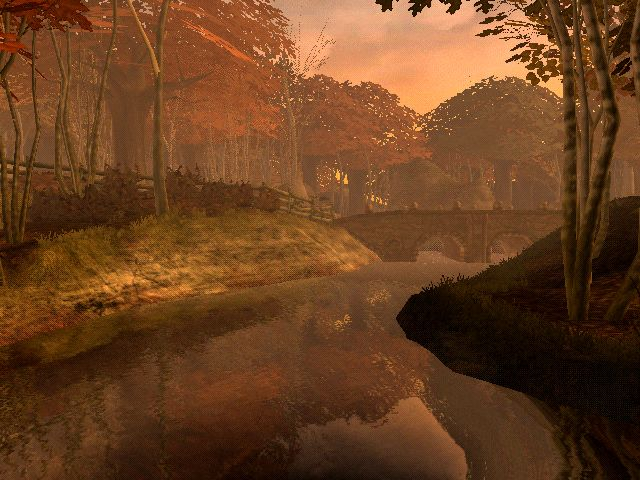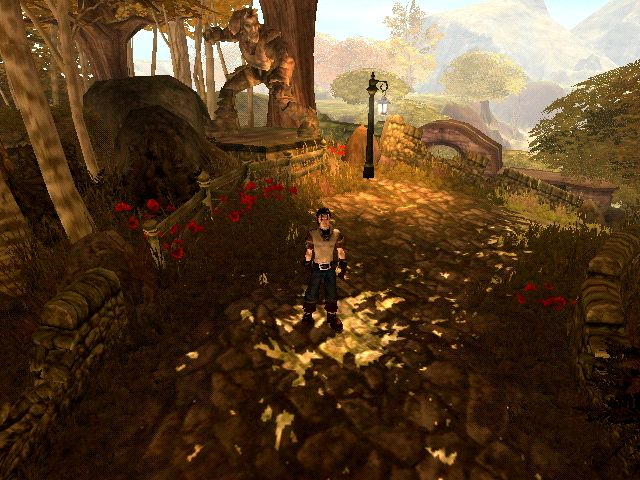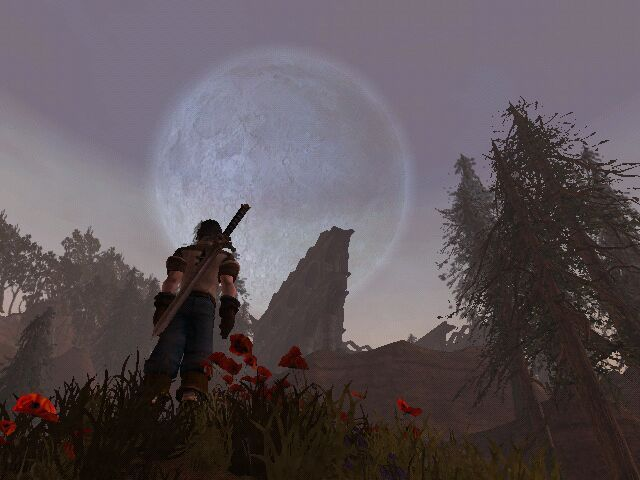The development of the game "Fable" ruined my life, but I do not regret it
An inside view of what we had to sacrifice to create a classic game.

It was the best of all times, it was the worst of all times; it was a century of wisdom, it was a century of stupidity; it was an era of faith, it was an era of unbelief; these were the years of light, these were the years of darkness; it was a spring of hope, it was a winter of despair; we had everything ahead, we had nothing ahead; we all rushed headlong to heaven, we all sped headlong to hell ...
- Charles Dickens, A Tale of Two Cities
I don’t think I could better describe my feelings about my work on Fable than Dickens did 160 years ago. The recent closure of Lionhead Studios makes this time ideal for telling some of the accumulated stories.
')
The best of all times
The best watches fly the fastest
- Georgiks, Virgil
The Big Blue Box game development company employed about 20 people when I joined them in December 2001, and, with some exceptions, they all worked through. The office was small, but it was located on the first floor of the building next to the river in Godalming, a village south of Gilford, where Lionhead was based.
The word "colorful" comes to mind.
I remember that on the first day I arrived late, having incorrectly calculated a trip on a “reliable” rail transport. And soon I got used to the strange sense of time inherent in the trains in that part of the country.
My computer was not ready, and I spent the first day waiting for the equipment to arrive and playing a very early version of the game, then called Project Ego, and then turned into Fable.
All together and led me to such tactlessness as the question "what button to jump." This was an ongoing problem for users at the time. But when I was introduced to the people in the office, I noticed astonishing drawings and an awesome-looking game. I was scared. How can I meet such high standards after seeing? And I was extremely happy to be part of what already looked like something special. I decided to do everything in my power to be sure to rise to the level of everyone else.

The following months were the usual baptism of fire, when I discovered how little I know, well, everything. I did not know anything about Direct3D, and I barely understood what a shader is. For this work, I studied the basics of OpenGL and C ++ for six months, which resulted in a demo that helped me get a place, but OpenGL and DirectX are completely different things, and it is much harder to understand DirectX.
Also, unlike self-education, my training took place under the supervision of the others. I felt so out of place that for some time I was seriously afraid that my probation would end badly. At work, there was a feeling of a club of people with one hobby: a place where a lot of people could have fun with what they liked and get paid for it. We were all friends, and in the office there was always an atmosphere of jokes and laughter. People rode around the office on scooters, stopping at the tables to greet and chat.
Now it seems to me that this was a disturbing sign. The atmosphere was too relaxed and fun - the work was done, but there was almost no sense of purpose. The dates for deadlines spoke with a smirk and a laugh. We joked about them, and did not treat them as things to worry about. We felt invulnerable. What could go wrong if you are supported by Lionhead, Peter Moligno and Microsoft?
All good things must end.
The finest moments always speed up and slip out of your hands when you want to hold on to them for as long as possible.
- “Gadfli brushstrokes”, E.A. Buccianeri
The warning bells began ringing louder on the road to E3 in 2003. Stress was clear: E3 (Electronic Entertainment Expo) at that time was a serious matter, and most studios planned to make shows, for which they spent enormous resources on assembling special builds for E3, which would show some kind of shamanism that was absent in the real game.
And, in my opinion, this time also marked the beginning of the end of our studio.
Many people who have worked with us have been doing this for a very long time, have had a lot of games and many decisions made. Even they could not anticipate the pain we had to endure. And newcomers to the industry could never have imagined what was in store for them.
It became clear that we were in trouble. We had a lot of cool stuff for the show - press demos, and those that we showed at E3 were always well received - but the open-secret was that we, in fact, did not have a game. So much else had to be done, so much else had not even been decided. We didn’t even have a plan for how to get to our goal. There were a lot of ideas, a lot of potential, but nothing concrete. If we wanted to release the game, we had to do something. And we did.

We were given a deadline for the care of the game for gold, and the real, real deadline that we had to perform, and waited from us that from that moment on we would begin to work hard in order to have time to do everything. And at that time it seemed reasonable. Then leave was canceled and working hours increased. There was more than a year until the end of the work.
Everyone agreed that this was the most difficult period they had ever experienced or even heard. The daily tasks were about the same as for the other works, but the total time of work and the degree of burnout exceeded everything that was tested before. One could expect strenuous injections for a couple of months; A few months of hard work would be less common, but still something familiar. But such a long and tireless work, as it was with us when developing Fable, was simply unheard of.
The team has changed dramatically. After the gear shift, almost the entire lineup of Lionhead joined the Fable team. Few evaded it. By this time, the Big Blue Box had already been bought by Lionhead - although some of us did not realize this.
Microsoft also threw developers into this mix to try to finish the job early. For our small team of less than 30 people, this meant that it suddenly doubled. People who you might not even know and not meet worked on the project. Over the course of a night, we have turned from a small close team into something completely different. It was hard not to feel indignation when all these newcomers entered our game.
The office in Godalming was packed with people. There were more people there than it would have been comfortable with having to negotiate with the people in the back to extend the chair. If we tried to do it at the same time, we would be stuck. A few months later, all this changed back when some people were transferred to Lionhead in Guilford. The The Engine team, to which I belonged, moved last. By the end of the project, only a small number of people who started in the Big Blue Box remained in the office.
But it worked, since from that moment we started to make pieces of the game together - there were locations, playing in which, you could feel yourself in the final version of the game. The world of Albion during the development process was redone countless times, but I think that it was at this time that everything began to settle down. Locations began to take on a finite form and become a game that people would eventually play.
Worst times
To be honest, in the development of Fable, our people just burned out, and we destroyed the team. Week after week, month after month, they worked 50, 60, 70, 80 hours a week. It destroyed their lives and their marriages.
- Peter Molinho, Develop, March 2009
Recycling is difficult to endure any amount of time. Even a few extended days of work in a row can lead to psychological and physiological changes.
When processing lasts for months, the consequences for the mind and body can destroy a person. Some argue that they bloom during times of stress, but I don’t think that anyone could have survived what we’ve been through developing Fable without suffering from it.
My schedule looked the same every day: get up, wash, get dressed, drink caffeine pills with strong coffee, take a Red Bull jar, cola and a couple of muesli bars on the way to the office. At work, I did not move away from the table, eating all the dinners behind him, and sometimes did not eat at all. When I was eating, it usually meant a sandwich from the supermarket. Often there was dinner at work - ready meals. Sugar and caffeine drinks and sweets provided support to my body.
At some point I gave up and went home, where I fell into bed and hoped to get some sleep before the new beginning of the cycle - but, unfortunately, caffeine, sugar and stress made rest difficult and intermittent. We worked at least 12 hours, six to seven days and a week. Weekends were spent on trivia related to survival - shopping, cleaning, and other tedious things.
Every day at work was similar to others. The computer, waking up, showed the same file that I left open, having gone to work. Often I looked at the same file for several days in a row. I tried to understand why nothing is working as it should, or to figure out how to implement this or that opportunity.
Worst of all were mistakes that refused to be corrected. The code looked like it had to work, but for some reason it did not work as it should, and nothing that I did did make the slightest change.
Sometimes I completely stumped. I even slipped into random changes in the code in the hope that by poking the code in the right place, I would make the error correct itself. But knocking the head against the clave would be more productive. Brain power was at zero. I exhausted all reserves and could not recover them.
Day after day, week after week, it was the same endless hours on the same schedule. It was impossible to distinguish one day from another. I even dreamed of work. Sometimes I didn’t know if I invented something, or it really happened.
I practically did not see anyone out of work. I had neither the time nor the strength to communicate. I missed family holidays - weddings, births, birthdays ... everything. I haven't had a haircut or shaved for months. In some sense, I was lucky that I had no partner or family. Those who had them had difficulty finding the time to see them at all, not to mention spending some time with them. On the other hand, perhaps their support would have been welcome.
The consequences were terrible. Relationships were tested for fracture, and a lot of people from the team, including me, sat on medications due to stress-related illnesses. The chatter disappeared from the office, and the smiles were replaced by grimaces of pain.
For me, the consequences were devastating. I was even prescribed neuroleptics for some time. I had headaches, tunnel vision, clouding, depression, agitation, panic attacks, paranoia, hallucinations and confused thinking.
In the end, I was forced to go to the hospital. I just couldn't handle it. Unfortunately, this time did not help either. I was consumed with too much guilt because the team suffered without me.
I am surprised that I survived.
Results
Every ending is a beginning. At that moment we just do not realize it.
- “Five People You Meet In Paradise,” Mitch Albom
We did release a gold release. The game was over, and, more importantly, the processing ended. We were like zombies imitating the movements of the living, but somehow we ended it.
Unfortunately, the damage done by Fable could not be so easily discarded.

Immediately after returning from a vacation, associated with the launch, I started Fable: The Lost Chapters. It was actually interesting to work on this game. Compared to what we finished, there was almost no pressure, and we knew what we needed to do and how long we would have to do it. There was also a feeling that we had already done complicated things, and everyone was quite relaxed.
But in my case, the damage has already been dealt. When I returned from the Christmas weekend, I realized that I could no longer stay in Lionhead. The company in which I settled, has already disappeared, as well as those things that I loved. I never felt that Lionhead was my place, and when it became clear that Microsoft would buy it, it became even less likely that I would feel comfortable there.
And it didn’t help at all that at the time I was very angry about what happened to Fable. I worked a deadline and left. And he did not work in the industry for several years in a row.
Regrets
Never regret what you did with sincere feeling; that which is born from the heart will not be lost.
- Basil Rathbone
And, despite what I went through - what we went through - I don’t regret the time spent on Fable. I am sad because of some things. I feel guilty for a few mistakes that we did not correct, and for what was broken after I left. Sorry that the open and lively world of Albion, as we conceived it, was replaced by transitions between levels. And it was done too late. Too bad what happened to me what happened, but I have no regrets.
For a very long time after I left Lionhead, I was terribly angry at what happened, and how everything turned out: I felt that we were treated incorrectly and kept in the dark, we were sucked, chewed and spat out. It took me a long time to calm down, step back, and realize that I could not regret it.
I can not regret the time spent developing Fable, despite the fact that it turned out so dark - because of all the good things that were there. Getting started at the Big Blue Box was “the best of the times,” and I would love to repeat this experience. I have a lot of good memories of working in the Big Blue Box.
These are the little things that make me smile. Football games at lunch with sweaters as goal posts. That time, when I tried to explain the displacement maps with a plate. Textures 512x512, which we made for flies flying around the head of the hero. A bug due to which the landscape used a texture for the eye.
The entire office then played the new Battlefield 1942 Wake Island at lunchtime for about a month. That time, when you could post a screen shot of what you were working on, to the company's newsgroup, and get great praise. Praise, respect, support, friendship and jokes - everything was in place. It was a great place.
There were parties - oh, parties! The parties at Lionhead were very special. I remember very few endings of most of our parties, which, given the things that happened there, I am not particularly proud. As written on the tombstone in Fable: The Lost Chapters, “I. Deniston Too much drunk punch sent him straight to the creator. "

I want to take a moment to say how ashamed I really am in front of everyone who participated in those ... incidents.
The fans also helped to relieve the pain we experienced while developing the game. To this day, I get rave reviews from players for working on Fable. Every time someone talks about playing it in a positive way, I smile, knowing that for good or ill, I took part in creating the game. I am immensely proud of the work done on Fable. The technologies I created and sometimes invented helped create the game that people played. And this feeling does not compare with anything.
There are screenshots that still look great, and the opportunity to show them and say “I did it” is really something special. Yes, of course, Fable would have turned out without me, but it would have been another Fable.
I also had the opportunity to work with the best people in the industry, and some of them remain my best friends. These are the people who made the many games I grew up in, including Syndicate, Dungeon Keeper, and Theme Park, and have since done something even more cool. My name is in the credits next to their names and with the names of such luminaries as Peter Moligno and Danny Elfman! How many more people can boast of it?
This story may not end with the words “happily ever after,” but I am glad that I have the privilege of adding a few words to it.
Yes, maybe this job broke me very seriously, but I don’t regret having worked on Fable.
Source: https://habr.com/ru/post/395093/
All Articles